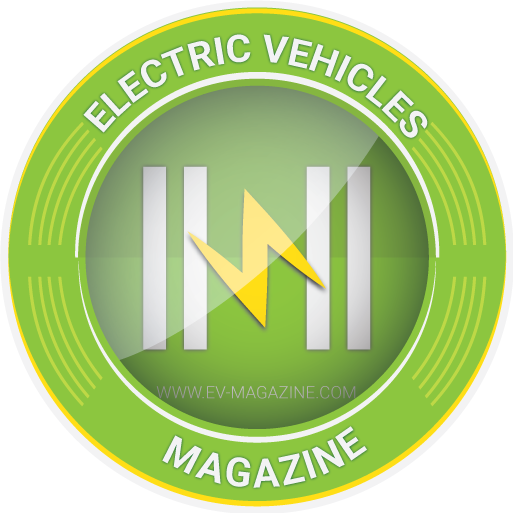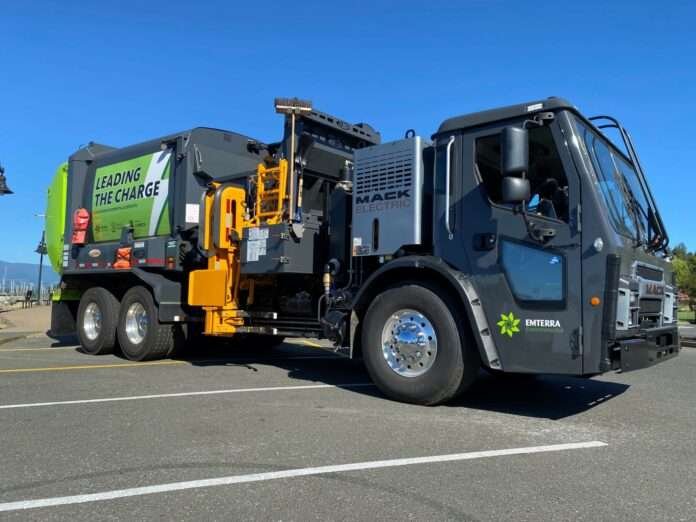July 16 marked important milestones for Mack Trucks, for waste management company Emterra Environmental, and the City of Courtenay and Town of Comox on Vancouver Island.
For Mack, the delivery of LR Electric refuse trucks to Emterra represented its largest single order of electric trucks. Three of a total eight electric refuse trucks were displayed during a special ceremony at the Comox Valley Marina, where they were welcomed with a traditional ceremony by special guests and members of the K’omoks First Nations.
The Mack LR Electric (Photo: James Menzies)
For Emterra, it was a special day because the company continued to expand its sustainability mandate in building a circular economy. And for residents and elected officials from the City of Courtenay and Town of Comox, it was an opportunity to improve air quality and reduce noise pollution for inhabitants.
The deployment of eight electric refuse trucks in the region electrifies Emterra’s entire local fleet and builds on the 2023 rollout of a Mack LR Electric in Peel Region outside Toronto.
“Leaning on new technologies to help us do our work more sustainably has been in our DNA since 1976,” Paulina Leung, chief sustainability officer with Emterra said in an interview with TruckNews.com at the event.
“We developed the first curbside recycling programs for residential areas and communities, then we leaned into adopting lower carbon vehicles; at that time, CNG. With the support we now have from manufacturers like Mack Trucks and its dealer network, it’s easier to scale the adoption of zero-emission vehicles so now we can work toward providing all our services with as minimal environmental impact as possible.”
Emterra runs about 500 trucks across Canada, nine of them now electric including the eight on Vancouver Island. It’s not a pilot project or experiment, Leung stressed.
“Through onboarding our first electric truck in the GTA (Greater Toronto Area), we’ve been able to learn through driver training and working with Mack and the dealer there, that our trucks are able to operate a full day without a midday charge,” she said. “It’s working head-to-head with more traditional technologies [such as diesel and CNG-fueled trucks].”
George Fotopoulos, Mack’s vice-president of its e-mobility business unit, told TruckNews.com the LR Electric carries 376 kWh of onboard power, which runs the powertrain, interior auxiliaries and Labrie automated side loader body.
The trucks can perform about 10 hours of work – or cover up to 100 miles (160 km) – on a single charge, he said. “Opportunity charging expands that capability, but it’s more than sufficient for the job at hand here in the Comox Valley,” he said.
The eight electric trucks will be used to service about 25,000 households and businesses in the community and will be supported by local dealer Nanaimo Mack. The LR Electrics’ twin electric motors put out about 448 hp and 4,051 lb.-ft. of torque.
The four nickel manganese cobalt oxide (NMC) batteries are charged with a 150 kW DC fast charger.
“We are excited that Emterra Environmental and the City of Courtenay and Town of Comox chose the Mack LR Electric refuse vehicle to help them accomplish their goals of reducing greenhouse gas emissions,” Jonathan Randall, Mack Trucks North America president, said in a related release. “This investment by Emterra signifies that refuse companies and municipalities recognize the importance of sustainability.”
(Photo: James Menzies)
Josie Osborne, B.C.’s minister of energy, mines and low-carbon innovation, was also on hand at the event and commended those involved in bringing the zero-emission vehicles to the province. The move aligns with the province’s own objective to significantly reduce transport-related emissions.
“Waste management trucks – they’re kind of ubiquitous,” she said. “You’ve all grown up with them and we see them going down the city streets. We’ve heard them going down the city streets and smelled the diesel fumes that are going down our city streets. And we know that they’re an essential mainstay of our urban infrastructure. They’re something that we absolutely depend on, but making them electric addresses one of the most significant sources of pollution in our neighborhoods.”
The province of B.C. has set out to slash emissions from the transportation sector by 27-32% through a multipronged approach that includes a shift to more energy efficient forms of transport, including electric vehicles.
As to whether the province’s electrical grid can support such a shift, Osborne insisted “We’re going to make sure that we’re ready to meet the growing demand [for electricity] and that we can get the power when it’s needed, where it’s needed.”
Just recently, B.C. announced a $3.2-billlion investment in the electrical infrastructure on Vancouver Island over the next 10 years to reinforce that grid, part of a broader $36-billion investment across the province focused on reinforcing high-voltage transmission lines and electric substations.
Source link
#Macks #largestever #order #electric #trucks #lands #Vancouver #Island








